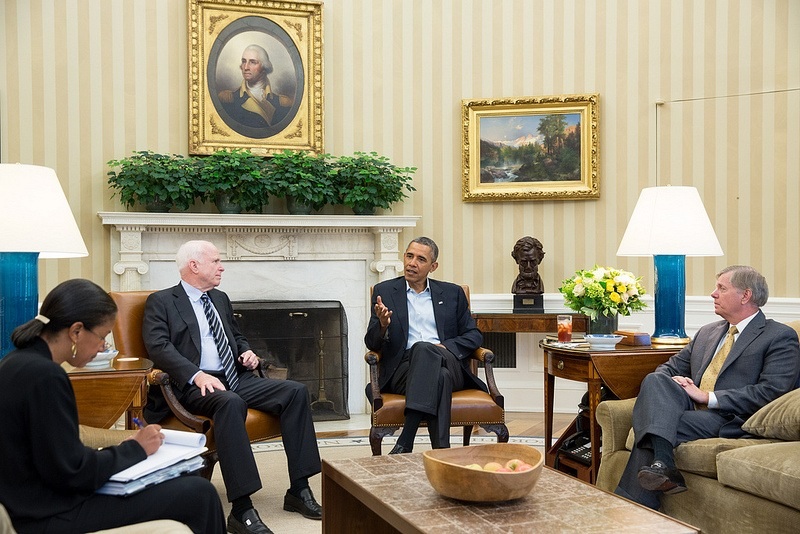With Capitol Hill gearing up for a consequential debate over U.S. military action in Syria, aides in both parties say it’s too early to predict the outcome of the vote. But the battles lines are emerging. Here are, broadly speaking, the key foreign policy factions on the Hill which will fight to have their voices heard on whether to back President Obama in punishing Syria’s regime for allegedly using chemical weapons against its own people:
Pro-Interventionist Republican Hawks
A vocal segment of the Republican Party, foreign policy hawks believe it is role of the United States, as the sole surviving superpower, to use its military might to stamp out brutal tyrants and prevent the world from spiraling into Hobbesian mayhem. This faction of the GOP reigned supreme during the post-9/11 Bush era but has lost some of its influence in the wake of the Iraq war and the election of Obama.
Their rationale for intervening in Syria: Bashar al-Assad’s regime must be overthrown for terrorizing and mass-murdering his own people, for threatening U.S. allies and interests in the region, and for flouting an international norm not to use chemical weapons.
“We believe President Obama is correct that the Assad regime’s use of chemical weapons requires a military response by the United States and our friends and allies,” Sens. John McCain (R-AZ) and Lindsey Graham (R-SC), the leading foreign policy hawks in Congress, said in a joint statement Saturday. But they wanted Obama to launch a broader intervention, calling on him to devise “an overall strategy that can change the momentum on the battlefield, achieve the President’s stated goal of Assad’s removal from power, and bring an end to this conflict, which is a growing threat to our national security interests.”
Liberal Humanitarian Interventionists
A faction of liberals has long supported limited, targeted U.S. interventions in war-torn places to advance humanitarian goals. And various Democrats, including the party’s congressional leadership, see the Syria mission in this light: a move to stand up for an oppressed people against a mass-murdering tyrant who has crossed a red line by, according to U.S. intelligence, employing chemical weapons to kill his own people.
It is this thinking that most closely resembles President Obama’s case for intervening. He doesn’t want regime change; he opposes U.S. boots on the ground. But according to this philosophy, deterring current and future tyrants from ever using chemical weapons is a vital humanitarian — and national security — goal that merits U.S. intervention in the war-ravaged Syria. (A similar philosophy incubated the Clinton-led U.S. intervention in Kosovo.)
“This attack is an assault on human dignity,” President Obama said in a Saturday speech televised around the world. “It also presents a serious danger to our national security. It risks making a mockery of the global prohibition on the use of chemical weapons. … It could lead to escalating use of chemical weapons, or their proliferation to terrorist groups who would do our people harm. In a world with many dangers, this menace must be confronted.”
War-Weary Conservative Isolationists
Isolationist sentiments are flourishing in key segments of the conservative movement and are poised to play a key role in the debate over Syria. This philosophy has long been an undercurrent in the GOP, waxing and waning over different eras, and has made a comeback since the failures of the Iraq War and more so since the election of a Democratic president, which made Republicans freer to express their war-weariness.
This school of thought, led today by Sen. Rand Paul (R-KY) and Rep. Justin Amash (R-MI), says it’s not the responsibility of the United States to fix problems in other countries or get involved in international conflicts unless doing so is absolutely critical to national security. Its proponents see the world as an immensely complex, dangerous place that the U.S. cannot and should not try to fix with its military might.
“I think it’s a mistake to get involved in the Syrian civil war,” Paul said Sunday on NBC News. “I think all of the bad things you can imagine are more likely if we get involved in the Syrian civil war.” He added Monday on Twitter: “When we fight, we fight because we have to and we fight to win. I’m not sending my son, your son or anyone else’s son to fight for stalemate.”
Anti-War Progressive Democrats
They’re not exactly pacifists, but a significant segment of the Democratic Party rejects the view that the answer to violence is more violence. Unless war clearly threatens U.S. interests, as in the case of World War II, these lawmakers are inclined to oppose military intervention. And they’re plainly unconvinced that an attack on Syria meets that standard.
“We are not the world’s policemen. That is not our responsibility,” Rep. Alan Grayson (D-FL) told CNN late last week. “I don’t know where we got this odd notion that every time we see something bad happen in the world, we should bomb it.”
This segment of the Democratic Party was marginalized in the aftermath of 9/11 but rose up again when Iraq descended into chaos. It saw vindication as the public concluded that the Iraq War was a mistake. Some Democrats sympathetic to this philosophy have been less aggressive about it in recent years, in deference to President Obama, but the school of thought remains strong among the liberal base, which may influence congressional Democrats.










